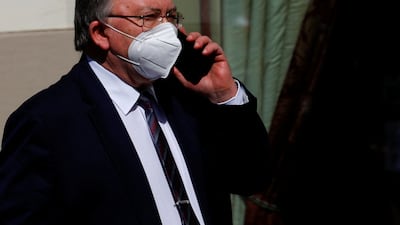Russia's representative at the Vienna talks has said the most important aspects of sanctions against Iran will be lifted.
Ambassador Mikhail Ulyanov told the Tehran Times on Tuesday: “I can tell you for sure that as a result of the Vienna talks, the main body of anti-Iranian sanctions will be lifted, including in the most important areas, such as oil, trade, and many, many other areas."
Iran, China, Russia, France, Germany, the UK and the EU are attending the talks in the Austrian capital – with a US delegation indirectly participating – with the aim of reviving the Iran nuclear deal.
The lifting of sanctions has been Iran's main concern during the talks, with an emphasis on guaranteeing that a new US administration after that of President Biden will not backtrack on agreements.
Mr Ulyanov spoke about these concerns.
"The problem is that it will remain valid as long as Mr Biden stays in the White House," he said.
"So, we are trying to elaborate on additional guarantees or additional provisions, which could make Iran a more attractive partner for private business from different countries.
"We are doing our best, and this work is not yet completed.”
One of Iran's main complaints has been that, even while the 2015 nuclear deal known as the Joint Comprehensive Plan of Action was in place, very little economic benefit was obtained.
This is largely because sanctions, especially those that have been put in place for decades, are difficult to unwind.
On top of that, private businesses are largely hesitant to make bets on Iran when there is no guarantee from the US that new sanctions will not be imposed.
Foreign companies that did head back into Iran after the 2015 deal had to quickly exit after the end of the Obama administration's tenure.
This was despite efforts by the Obama administration to fully implement the terms of the deal. In 2016, Secretary of State John Kerry rallied officials from the US Treasury to encourage foreign firms to undertake “legitimate business” in Iran, over a year after the Iran deal took effect.
At the time, Stuart Levey, a former US Treasury under secretary for terrorism and financial intelligence and then legal director for HSBC, said that significant risk of sanctions remained for foreign investors.
“Governments can lift sanctions, but the private sector is still responsible for managing its own risk," he said.
Mr Levey told The Wall Street Journal that despite Iran allowing UN inspectors back into the country under the Iran deal – the main point of contention in current talks – other issues such as Iran’s ballistic missile programs and support of terror organisations could still pose a risk to foreign investors.
Companies could unwittingly do business with companies linked to those efforts, Mr Levey warned.
This raises the prospect of tensions re-emerging over Iran’s regional non-nuclear activities in the event that a new deal can be reached on UN inspections of nuclear sites, and lifting of sanctions.
Iran 'will not surrender to pressure'
Meanwhile, other parties to the talks are continuing to indicate support for the process.
In Iran, Supreme Leader Ayatollah Khamenei gave passing support to the talks telling citizens: "We will not surrender to pressure from the enemy, but negotiations and engagement with the enemy are another matter.”
Iran's foreign minister Hossein Amirabdollahian, who is now on a tour of the country's Gulf neighbours, struck an optimistic tone, telling reporters in Qatar's capital Doha that he has been keeping regional governments abreast of developments in Vienna.
"As neighbours, they have the right to be aware of the negotiations between Iran and the P4+1," he said.


